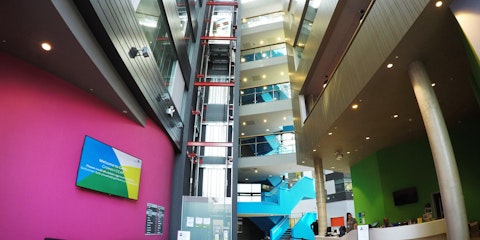English Language - AS
About this course
The English Language AS Level programme is a one-year course of study and should be taken in conjunction with two or three other subjects and the Welsh Baccalaureate.
As well as continuing to develop your writing, speaking and listening skills, you will also study the English language itself, learning about:
- Its structure and variety
- How it is used differently in speech and in writing
- How and why it has changed and goes on changing
- How we use it in different ways according to the situations we are in
If you are thinking of becoming a Primary or Junior School teacher, this course will give you a great head start. It is also excellent preparation for courses in Journalism, Linguistics, Communications or Speech Therapy.
What you will study
AS English Language covers the following two units:
Unit 1: External written examination (summer term): 1hr 45m
There are two sections in this examination: Section A and Section B.
Section A: Analysing language (20%)
In preparation for this question, candidates will study a range of examples of spoken and written texts, which will ensure they become familiar with features of spoken and written language. You are required to answer one question seeking to analyse the way in which speakers and writers use language to shape meaning, using appropriate terminology and methods of analysis which are supported with apt quotation.
There will be at least two texts linked by either theme or genre with which you will analyse, interpret and explore the connections between the texts, seeking to interpret the effects created by the speakers’ or writers’ use of language.
Section B: Contemporary English (20%)
In preparation for this examination, candidates will study the ways in which language is used distinctively in the 21st century and will learn to appreciate that language is constantly evolving to meet the needs of its users. There will be a single text or a set of data with a focused question. These may be spoken of written texts, as well as a Welsh focus. This section requires candidates to write an expanded response (essay) in which they show their understanding of contemporary language concepts and issues. Candidates must consider the effect of contextual factors (pragmatics), and analyse the way language is used to construct meaning. Such concepts will include
- New channels of communication
- Changes in vocabulary linked to technology
- Social or regional influences
Learners will need to critically evaluate how contextual factors affect form and structure, analyse how language features shape meaning and show critical understanding of concepts and issues underpinning language use.
Unit 2: External written examination (summer term): 2 hours
Language Issues and Original and Critical Writing
In this exam, there are two questions. Candidates must choose to complete either Question 1 or Question 2. In each question there are three parts:
Part a: Language Issues:
This part is based on the study of two language topic areas: language and power, and language and situation. Candidates are required to write an extended response (essay) in which they show their knowledge of language issues, using appropriate terminology to explore how meaning is constructed. Students will need to demonstrate their understanding of concepts and issues by analysing and evaluating how contextual factors and language features shape meaning. The response needs to illustrate the use of accurate terminology, which is well supported and to also demonstrate clear written expression in a well-organised response.
Part b: Original writing:
Candidates are required to produce an original piece of writing linked to a language topic area they have considered in Part a. This provides students with the opportunity to write creatively using their language knowledge. Candidates will therefore have to have an awareness of the audience, form and purpose of their creative piece.
Part c: Critical writing:
Candidates will produce a commentary on their writing. They will analyse and evaluate their own language choices to show their understanding of their chosen topic area. Candidates need to use apt quotation in critically analysing and evaluating their language features in order to achieve particular effects.
Entry requirements
Individual Subject Entry Requirements English Language minimum B
Teaching and assessment
One written exam and coursework
Important points
- The College welcomes contact with parents/guardians of students who are under 18.
- Additional support is available for students with learning difficulties and disabilities.
- Cardiff and Vale College is committed to inclusion and values diversity. We are determined to promote equality of opportunity and to treat everyone fairly and with respect.
- Cardiff and Vale College reserves the right to make changes to this course without prior notice.
- Course fees are subject to change. Your fee will be confirmed prior to enrolment.
- All courses are accurate at the time of upload or print.
- Courses can only run if there are sufficient numbers.
- Please note, if you choose three or more course choices, then you may be referred for a careers appointment first. This does not apply to A Level or GCSE choices.
Start date
End date
Time of day
Full Time
Course code
Qualification


Facilities
More...
CAVC is a great place to study A Levels – the teachers, the support, the facilities and social experience has been so good – I’m delighted to have gained all A’s in my AS exams. The support to apply and prepare for university is brilliant and I’m looking forward to progressing after college.
Career prospects & further study
500
On completion of the A Level programme, the majority of our students progress onto universities across the country and beyond. Based on this course, there are many options but below are just a few examples of degree programmes you could go on to study at University:
- Creative Writing
- English Language
- English Literature
- History
- Government and Politics
- Languages
- Psychology





